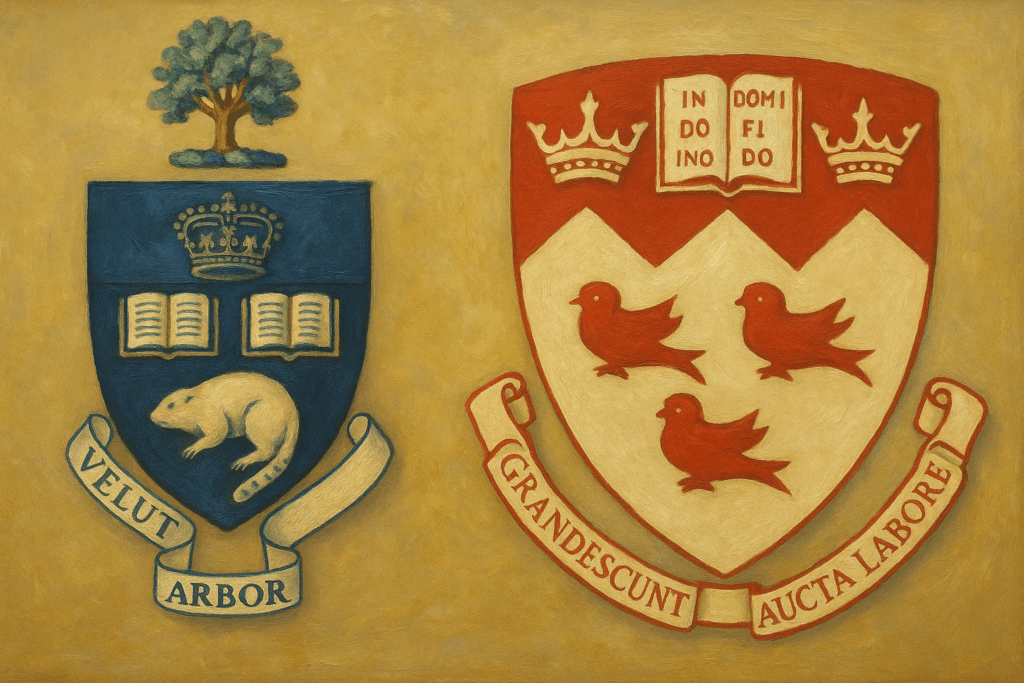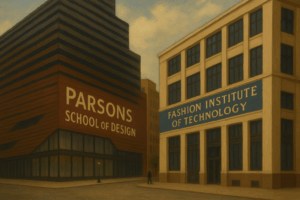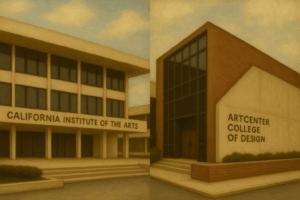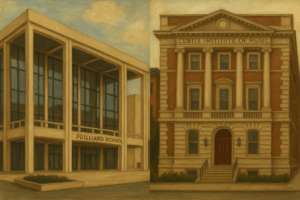
The GOAT of Canadian Universities?
When discussing the pinnacle of Canadian higher education, the University of Toronto and McGill University have established themselves as the two pillars of academic excellence, forming a long-standing rivalry much like Harvard and Yale in the United States. While both universities boast global renown, that prestige stems from different historical backgrounds and unique cultures.
This report, based on the latest 2025 information, aims to provide an in-depth analysis of the core differences between these two institutions. Moving beyond simple ranking comparisons, the goal is to offer profound insights into each university’s intrinsic characteristics and academic atmosphere, enabling prospective students to determine which is a better fit for their future.
1. Global Prestige: Academic Standing in the 2025 Rankings
A Comparison of Overall Rankings: Their Position on the World Stage
A look at the major world university rankings published for 2025 reveals a trend where the University of Toronto holds a slight overall edge. However, in terms of domestic reputation within Canada, McGill University still wields immense influence.
| Ranking Body | University of Toronto (2025 Rank) | McGill University (2025 Rank) |
|---|---|---|
| QS World University Rankings | 25th | 29th |
| Times Higher Education (THE) World University Rankings | 21st | 45th |
| Maclean’s Canadian Overall Reputation Ranking | 1st | 3rd |
| Maclean’s Canadian Medical/Doctoral Ranking | 2nd | 1st |
The Truth Beyond the Rankings: Research Power vs. Traditional Prestige
A deeper dive into the metrics of various rankings reveals that the University of Toronto’s strength stems from its vast research scale and resources, whereas McGill University’s reputation relies more heavily on the symbolic authority derived from its long history and tradition.
The University of Toronto showcases the characteristics of a ‘Research Powerhouse,’ a model of a modern research-focused university that excels in quantitative indicators. In contrast, McGill University is recognized for its value as a ‘Prestigious Institution,’ built on a long history and an image of selective, elite education.
2. History and Tradition: The Defining Moments of Two Universities
University of Toronto: From the Anglican King’s College to a Secular Federated University
The history of the University of Toronto began in 1827 as the Anglican-affiliated ‘King’s College.’ When the university transitioned into a non-denominational institution, colleges from various religious backgrounds began to join the University of Toronto federation while maintaining their independence.
The university’s motto, ‘Velut arbor ævo’ (As a tree through the ages), symbolically represents this history of growth and evolution. Upon admission, students are affiliated with one of seven colleges, allowing them to be part of a smaller community and receive academic and social support within the massive university.
McGill University: The Legacy of a Scottish Merchant and the Heart of Montreal
McGill University was founded in 1821 following the will of James McGill, a successful fur trader of Scottish descent. The fact that it originated not from a state or religious body, but from the vision of a single merchant who amassed wealth through international trade, instilled a practical and international DNA in McGill University. The university’s development has gone hand-in-hand with Montreal’s growth into a cultural and economic hub of North America.
3. Campus Culture and Student Life: The City is the Campus
University of Toronto: A Small Community Within a Megacity
The core of student life at the University of Toronto’s St. George campus is undoubtedly its ‘college system.’ It serves as a crucial mechanism that provides a sense of belonging to a small community within a massive student body of over 40,000. The campus is fully integrated into the heart of Toronto, Canada’s largest city, allowing students to live at the center of a global financial, cultural, and technological hub and access limitless opportunities.
McGill University: Embracing Montreal, the Paris of North America
Student life at McGill University cannot be considered separately from the unique culture of Montreal, often called the ‘Paris of North America.’ The bilingual environment where English and French coexist, the relatively lower cost of living compared to Toronto, and the European-style architecture combined with a vibrant arts, music, and culinary scene make the McGill experience special. McGill students tend to build their identity by using the entire city of Montreal as their stage.
4. Alumni Who Move the World: Leaders Produced by Each University
Figures Produced by the University of Toronto
The University of Toronto’s alumni list is filled with giants from the political, economic, and scientific circles who have led Canada’s modern history.
| Name | Field | Key Achievement |
|---|---|---|
| William Lyon Mackenzie King | Politics | Canada’s longest-serving Prime Minister (10th). |
| Lester B. Pearson | Politics/Diplomacy | Prime Minister of Canada, Nobel Peace Prize laureate. |
| Frederick Banting | Science/Medicine | Co-discoverer of insulin, Nobel Prize laureate in Physiology or Medicine. |
| Geoffrey Hinton | Science/Technology | ‘Godfather of AI,’ pioneer in deep learning, Nobel Prize laureate in Physics. |
| Margaret Atwood | Literature | Author of ‘The Handmaid’s Tale,’ world-renowned novelist. |
| Lorne Michaels | Entertainment | Creator of ‘Saturday Night Live.’ |
| Roberta Bondar | Science/Space | Canada’s first female astronaut. |
| David Cronenberg | Film | World-renowned film director. |
| Paul Martin | Politics/Economy | 21st Prime Minister of Canada, also served as Minister of Finance. |
| Jim Balsillie | Economy/Technology | Co-founder of BlackBerry. |
Figures Produced by McGill University
Many of McGill University’s alumni are figures who have left a deep mark on global culture and innovation beyond national borders.
| Name | Field | Key Achievement |
|---|---|---|
| Justin Trudeau | Politics | 23rd Prime Minister of Canada. |
| Leonard Cohen | Music/Literature | World-renowned singer-songwriter and poet. |
| William Shatner | Entertainment | Actor (Captain Kirk in ‘Star Trek’). |
| James Naismith | Sports/Innovation | Inventor of basketball. |
| John O’Keefe | Science/Medicine | Discoverer of ‘place cells’ in the brain, Nobel Prize laureate in Physiology or Medicine. |
| Julie Payette | Science/Space | Former Governor General of Canada, astronaut. |
| Thomas Chang | Science/Medicine | Inventor of the world’s first artificial blood cell. |
| Steven Pinker | Academia/Psychology | Renowned cognitive psychologist and author. |
| Moshe Safdie | Architecture | World-renowned architect. |
| Wilfrid Laurier | Politics | 7th Prime Minister of Canada, the first French-Canadian Prime Minister. |
Conclusion: The Optimal Choice for Your Future
The choice between the University of Toronto and McGill University can be described as a choice between a ‘structured, large-scale system’ and an ‘atmospheric, international hub.’
- Academic Standing:
- The University of Toronto is a ‘research powerhouse’ based on its vast research scale.
- McGill University is a ‘symbolic prestigious institution’ with a long history and a tradition of elite education.
- Campus Culture:
- The University of Toronto provides a sense of belonging and stability through its ‘college system’ within a massive urban environment.
- At McGill University, the unique culture of Montreal itself becomes the campus, leading to the formation of autonomous communities.
- Ideal Graduate Profile:
- The University of Toronto is a ‘nursery for national talent’ that takes on central roles in Canadian society.
- McGill University is a ‘cradle for global innovators’ who create new cultures and innovations beyond borders.
Reflecting on whether you prefer to grow steadily with systematic support or enjoy blazing your own trail in a free and multicultural environment will be the first step toward a wise choice. Whichever you choose, there is no doubt that both universities will provide a world-class education and an experience that will be an asset for a lifetime.


